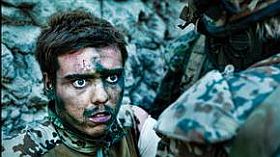


Janus Metz: Armadillo 2

Take a look at the boy. Look at his eyes. See the fear of a soldier. A very young Danish soldier who has just been hit. He serves in Afghanistan, he fights Taliban. He is caught at that very moment of injury in the film of Janus Metz. The cameraman Lars Skree filmed the sequence of the wounded soldier who has his eyes wide open. A sequence where the boy seems about to faint and where you as spectator (at least I did) gets the impression that he is dying. His head falling down as if he is losing consciousness.
He did not die. In the film he returns to the image a couple of times. In a hospital scene where he is happy to meet his pals from the camp, and at the end of the film where he with a big, proud smile shows his family the scar. A memory from Afghanistan.
It is amazing how close the director and his cameraman have come to the characters in the camp in the Helmand province. They have filmed in the camp, in the tanks, on mission, in combat, at debriefing sessions. They have filmed and recorded phone calls to home in Denmark, they have filmed the free time activities from swimming to watching hard core porno films. It is such a rich material they have collected to make
this classically built, creative documentary that has all you could ask for in terms of epic quality.
It begins up-front with the boys saying godbye to mum and dad and girl friend. It goes through training sessions before departure, to the meeting with the platoon commander, Rasmus, one of the main characters in the film, who welcomes the new ones by promising them that ”it is going to be interesting”.
And right he is, very much so, and not only for the newcomers but also for the audience. Step by step the filmic narrative brings the informational background to the dramatic situations. The camp as a location is described as well as the technological equipment that is used – surveillance drones that bring back message about where HE is; through the whole film Taliban, the enemy, is called ”him”.
And step by step the action escalates from small, mostly scouting operations to confrontations. With the crucial one placed naturally towards the end of the film: five talibans are being killed, firstly through a hand grenade, secondly by the ”finishing off” of the wounded.
But what is the most astonishing achievement of this film is the way that the films gives space for characters and character development. They are boys, they have chosen to go to Afghanistan, but why? To fight for democracy and for the future of a country, well maybe also that, but first motivation is the longing for company, the seek for a team spirit, and for something to happen in their lives. Excitement, action, fight. Without really knowing what it is to be there. ”You have to be here to understand”, as one of the soldiers say.
I don’t understand the boys, I don’t understand what they are doing there, and the film ”agrees” to a certain degree that the mission is hopeless, for instance through small conversation scenes that take place between the soldiers and the local peasants, who all doubt the success of the foreign soldiers.”Salaam aleikum”, it is said, followed by some general remarks and then nothing else. The contact to the local population is almost not existing. We can’t distinguish between them and the talibans.
I don’t understand them, but I have full sympathy for them, I like them as they are unfolded as characters in the film. Mads is for me the main character, this silent boy, who always sits in the corner listening to the more bragging fellow soldiers. He obeys. I see, and can identify (again a fine edited moment by Per K., the editor, who has done a marvellous job) with his parents standing in the airport looking at their boy leaving… will he come back? The end credits gives the information that he – and several of the others – wants to go back to Afghanistan!
The director does not directly communicate his standpoint, and good for that, we have seen enough films where directors, mostly from a journalistic point, are more than eager to judge and express their opinions. Janus Metz and Lars Skree seek and succeed perfectly, from a humanistic point of view, to bring us into a world that we could not imagine existed in the way it is documented and interpreted here. Even the most horrendous words coming out of the mouth of Rasmus, the platoon commander, or from Ølby, the tattooed constantly joking warrior, are put forward with a no-finger-pointing, non-moralising gentleness, many times in small, well-placed conversation pieces between two soldiers. Example: as Rasmus says on one occasion – ”the worst would be to be all dressed up with no one to blow”. They are literally dressed up in a battle dress or in bathing equipment as were they in a holiday camp for teenagers!
Absurd scenes are often elegantly put in as an invitation to reflection and interpretation. Like the superb one with a couple of the soldiers motorbiking in the courtyard of the base – Werner Herzog could not have done it better. Loneliness it says, or I am bored, give me something to do. Is it far from the scene with the attempts to pick up the corpses from the ditch (”we hit the jackpot in the ditch”!)… or is it not?
Something is rotten… in Denmark and with Denmark, a belligerent nation, a nation at war.
Denmark, 2010, 100 mins. Director: Janus Metz. Camera Lars Skree. Producer: Ronnie Fridthjof, Sara Stockmann. Edit: Per K. Music: Uno Helmerson. Production: Fridthjof Film Doc. Cinema Release in Denmark July 7, runs at the Cannes Film Festival and is prebought by numerous tv-stations in the world.
http://armadillothemovie.com/armadillo/TRAILER.html